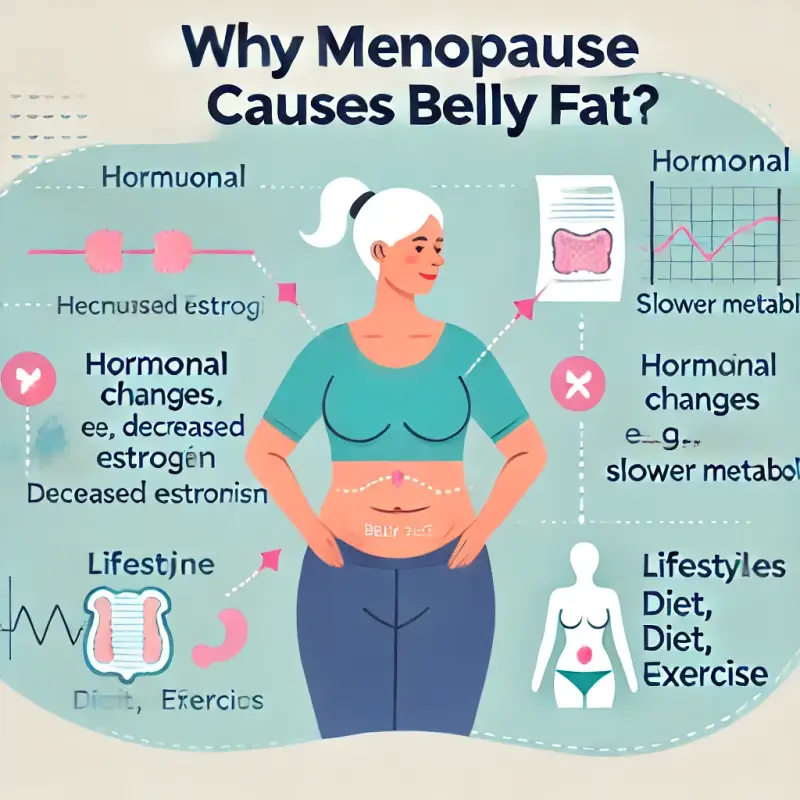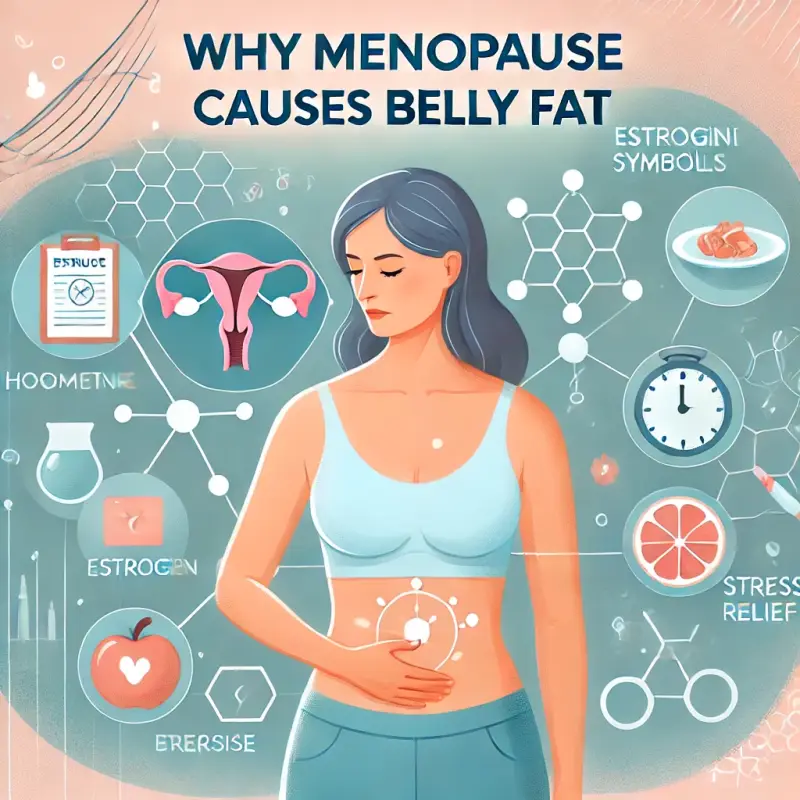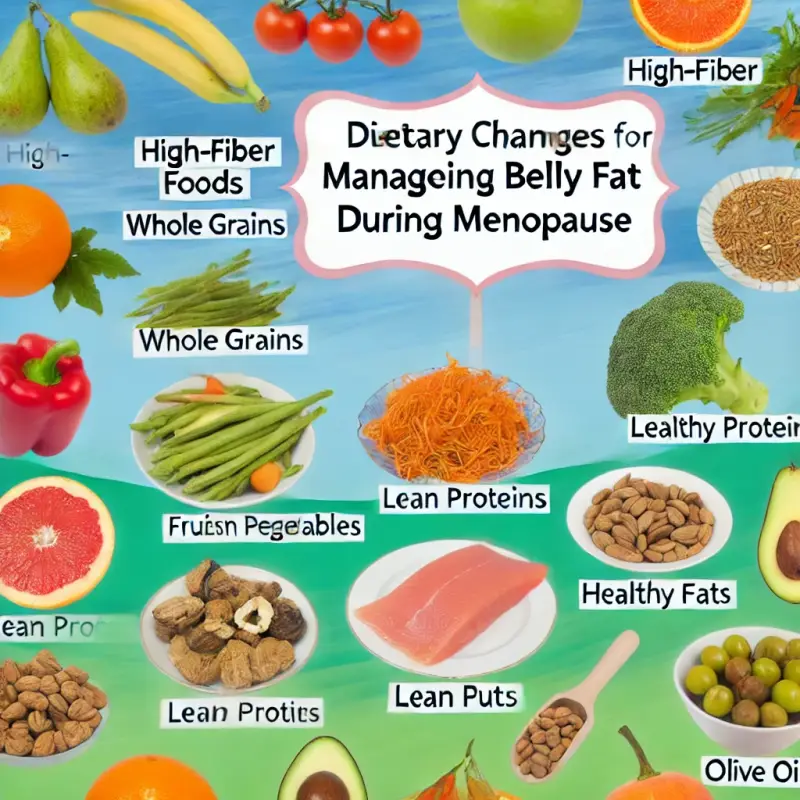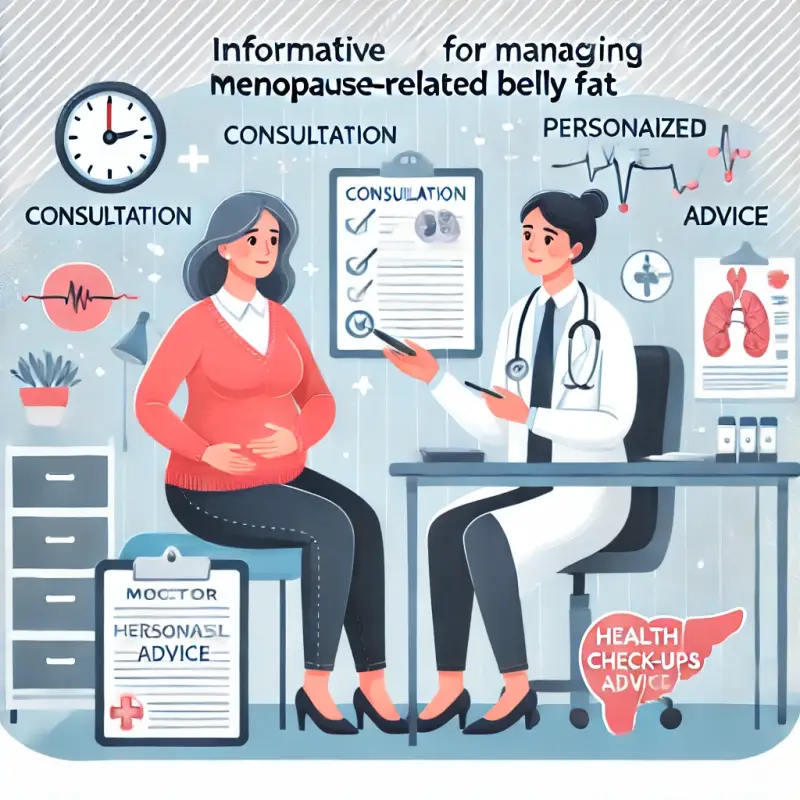If you're here, you're probably experiencing or approaching menopause and have noticed changes in your body, particularly an increase in belly fat. You're in the right place!
We understand the challenges that come with menopause, and we're here to answer your burning questions and provide you with practical tips to manage these changes effectively.

Understanding Why Menopause Causes Belly Fat
Menopause is a natural part of aging, but it brings about significant changes in the body. One of the most common and frustrating changes many women experience is an increase in belly fat.
This shift in fat distribution is not just about aesthetics; it also has important health implications. Let's dive into the reasons behind this change and explore what you can do about it.
What is Menopause?
Menopause marks the end of a woman's menstrual cycles and is diagnosed after 12 consecutive months without a menstrual period. It typically occurs in women aged 45-55 but can happen earlier or later.
During menopause, the body's production of estrogen and progesterone declines, leading to various symptoms such as hot flashes, mood swings, and sleep disturbances.
Common Symptoms of Menopause
| Symptom | Description |
|---|---|
| Hot Flashes | Sudden feeling of warmth, often intense, spreading over the body. |
| Night Sweats | Episodes of excessive sweating during sleep. |
| Mood Swings | Rapid changes in mood, including irritability and depression. |
| Sleep Disturbances | Trouble falling or staying asleep, often due to night sweats. |
| Weight Gain | Increased body fat, especially around the abdomen. |
| Vaginal Dryness | Reduced lubrication, leading to discomfort. |
External Link: For more detailed information on hormonal changes during menopause, visit Mayo Clinic’s Menopause Overview.
Hormonal Changes During Menopause
The hormonal fluctuations during menopause play a crucial role in many of the physical change’s women experience, including weight gain and fat redistribution.
- Estrogen's Role: Estrogen helps regulate fat distribution. As estrogen levels drop, fat tends to accumulate more in the abdominal area rather than the hips and thighs.
- Progesterone and Testosterone: While estrogen gets the most attention, changes in progesterone and testosterone levels also contribute to changes in body composition.
Fact: Studies have shown that the decline in estrogen levels during menopause is linked to an increase in abdominal fat. This shift is significant because abdominal fat is more metabolically active and associated with higher health risks than fat stored in other areas.
Why Does Menopause Cause Belly Fat?
Menopause causes belly fat due to a combination of hormonal changes, a slowing metabolism, and lifestyle factors.
- Estrogen Decline: As mentioned, lower estrogen levels lead to increased abdominal fat storage.
- Metabolism Slowdown: Age-related decline in muscle mass and metabolic rate means fewer calories are burned at rest.
- Lifestyle Factors: Reduced physical activity and dietary habits can exacerbate weight gain.

- Hormonal Changes: Lower estrogen levels directly influence fat distribution.
- Metabolic Rate: Aging and hormonal changes slow down metabolism.
- Physical Activity: Less activity leads to more fat accumulation.
- Diet: Unhealthy eating habits contribute to weight gain.
External Link: Learn more about the effects of estrogen on weight gain from BB/GYN Associates of Alabama
The Science Behind Hormonal Weight Gain
Understanding the science behind hormonal weight gain during menopause can help you better manage this transition.
- Fat Distribution: Estrogen plays a role in regulating body fat distribution. When estrogen levels drop, the body tends to store more fat in the abdominal area.
- Insulin Sensitivity: Lower estrogen levels can lead to decreased insulin sensitivity, making it harder for the body to regulate blood sugar levels and leading to weight gain.
- Muscle Mass: Estrogen helps maintain muscle mass. With lower estrogen levels, muscle mass decreases, leading to a slower metabolism.
Factors That Exacerbate Belly Fat During Menopause
Several factors can worsen the accumulation of belly fat during menopause:
- Sedentary Lifestyle: Lack of regular exercise reduces the number of calories burned, leading to weight gain.
- Unhealthy Eating Habits: Diets high in processed foods, sugars, and unhealthy fats contribute to fat storage.
- Lack of Sleep: Poor sleep quality and quantity can affect hormones that regulate hunger and appetite, leading to overeating.
- Stress: Increased stress levels raise cortisol, a hormone that promotes fat storage, particularly in the abdominal area.
Case Study: A study published in the Journal of Mid-Life Health found that women who engaged in regular physical activity and maintained a healthy diet had significantly less abdominal fat than those who were sedentary and consumed a poor diet.
External Link: For more on how lifestyle affects menopause, visit WebMD’s Menopause and Lifestyle.
Tips to Manage Belly Fat During Menopause
Managing belly fat during menopause requires a combination of lifestyle changes, dietary adjustments, and physical activity. Here are some practical tips to help you combat abdominal fat:
Regular Exercise
Regular physical activity is crucial for maintaining a healthy weight and reducing belly fat.
- Cardio Exercises: Activities like walking, running, cycling, and swimming help burn calories and improve cardiovascular health.
- Strength Training: Building muscle through resistance exercises (e.g., lifting weights, using resistance bands) increases metabolism and helps reduce body fat.
- Flexibility and Balance Exercises: Practices like yoga and Pilates improve overall fitness and reduce stress.
- Aim for at least 150 minutes of moderate-intensity aerobic activity per week.
- Include strength training exercises at least twice a week.
- Incorporate flexibility and balance exercises to improve overall well-being.
Internal Link: Learn more about integrating exercise into your daily routine in our article on A Must Try Fat Burning Exercises: Start Seeing Results!
Dietary Changes
Making informed dietary choices can significantly impact your ability to manage belly fat.
- High-Fiber Foods: Foods rich in fiber, such as fruits, vegetables, whole grains, and legumes, help you feel full and reduce overall calorie intake.
- Lean Proteins: Protein helps maintain muscle mass and increases satiety. Include sources like chicken, fish, tofu, and legumes.
- Healthy Fats: Incorporate healthy fats from sources like avocados, nuts, seeds, and olive oil, which are beneficial for heart health and satiety.

- Reduce intake of sugary foods and drinks.
- Avoid processed foods high in unhealthy fats and additives.
- Drink plenty of water to stay hydrated and support metabolism.
Stress Management Techniques
Effective stress management can help control belly fat by reducing cortisol levels.
- Mindfulness and Meditation: Practices like mindfulness and meditation can help reduce stress and promote emotional well-being.
- Breathing Exercises: Simple breathing exercises can quickly lower stress levels.
- Hobbies and Leisure Activities: Engaging in hobbies and activities you enjoy can help manage stress effectively.
- Practice mindfulness meditation for at least 10 minutes daily.
- Use deep breathing techniques to manage acute stress.
- Spend time on hobbies and activities that bring you joy.
External Link: Learn more about stress management from Mayo Clinic’s Stress Management.
Medical Interventions for Managing Belly Fat
In some cases, medical interventions may be necessary to manage belly fat during menopause. Here are a few options to consider:
Hormone Replacement Therapy (HRT)
HRT involves taking medications that contain female hormones to replace the ones the body no longer makes after menopause.
- Pros: Can help reduce menopausal symptoms and may help with weight management.
- Cons: Potential risks include an increased risk of certain cancers and cardiovascular issues.
- Discuss the risks and benefits of HRT with your healthcare provider.
- Consider HRT if you have severe menopausal symptoms affecting your quality of life.
Medications and Supplements
Certain medications and supplements can assist in managing weight and reducing belly fat.
- Weight Loss Medications: Prescription medications can help manage weight but should be used under medical supervision.
- Supplements: Supplements like vitamin D, calcium, and omega-3 fatty acids may support overall health during menopause.
Consulting Healthcare Professionals
It's essential to consult with healthcare professionals to develop a personalized plan for managing belly fat during menopause.

- Schedule regular check-ups with your healthcare provider.
- Discuss your symptoms and concerns openly.
- Follow medical advice tailored to your specific needs.
External Link: For more on managing menopause, check out WebMD’s Guide to Menopause.
Real-life Stories and Experiences
Hearing from other women who have successfully managed belly fat during menopause can provide valuable insights and encouragement. Here are some real-life stories and experiences:
Case Study: Sarah’s Success Story
Sarah, a 52-year-old woman from California, struggled with menopause-related belly fat for years. She decided to make some significant lifestyle changes after consulting with her healthcare provider.
- Exercise Routine: Sarah incorporated daily walks and strength training exercises into her routine. She found that regular physical activity not only helped her lose belly fat but also improved her overall mood and energy levels.
- Dietary Changes: She focused on eating whole, unprocessed foods and reduced her intake of sugars and unhealthy fats. Sarah included plenty of vegetables, lean proteins, and healthy fats in her diet.
- Stress Management: Sarah started practicing yoga and mindfulness meditation to manage her stress levels. She noticed a significant reduction in her cortisol levels and improved emotional well-being.
"Making these changes wasn't easy, but the results were worth it. I feel healthier and more confident now."
-Sarah
For more inspiring stories, visit this article on Success Stories: Managing Menopause and Weight.
Case Study: Emily’s Journey
Emily, a 48-year-old woman from New York, faced challenges with weight gain during menopause. She shared her journey to inspire others:
- Community Support: Emily joined a local support group for women going through menopause. Sharing experiences and tips with others in a similar situation provided her with motivation and support.
- Medical Advice: After discussing her symptoms with her doctor, Emily started Hormone Replacement Therapy (HRT) which helped alleviate some of her menopausal symptoms and made it easier to manage her weight.
- Healthy Habits: Emily focused on maintaining a balanced diet and staying active. She incorporated swimming and cycling into her routine, which she found enjoyable and effective.
"Connecting with other women and getting professional advice made a huge difference in my journey."
-Emily
Here's the chart visualizing the hormonal changes during menopause. It shows the decline in estrogen, progesterone, and testosterone levels across three stages: before menopause, during menopause, and after menopause.
Frequently asked questions (FAQs)
To provide more clarity on why menopause causes belly fat and how to manage it, here are some frequently asked questions:
Does menopause cause belly fat for everyone?
While many women experience an increase in belly fat during menopause due to hormonal changes, not everyone will gain weight in the same way. Factors such as genetics, lifestyle, and overall health play a significant role.
How long does menopause-related belly fat last?
The duration of menopause-related belly fat can vary. For some women, it may be a temporary phase, while for others, it may persist longer. Maintaining a healthy lifestyle can help manage and reduce belly fat over time.
Can lifestyle changes alone manage menopause belly fat?
In many cases, lifestyle changes such as regular exercise, a balanced diet, and stress management can significantly impact managing menopause belly fat. However, some women may also benefit from medical interventions like Hormone Replacement Therapy (HRT).
Are there specific diets recommended for menopause belly fat?
A diet rich in whole foods, high in fiber, lean proteins, and healthy fats is recommended. Avoiding processed foods, sugars, and unhealthy fats can help manage weight.
It's always best to consult with a healthcare provider or a nutritionist for personalized dietary advice.
Conclusion
Managing belly fat during menopause can be challenging, but understanding the causes and implementing effective strategies can make a significant difference.
By focusing on regular exercise, healthy eating, stress management, and seeking medical advice, when necessary, you can take control of your health during this phase of life.
We hope you found this post helpful. Please share your experiences and tips in the comments below.
NEW "purple tea" melts 2lbs daily
I'm sure you've been told that drinking tea in the morning can help you lose weight, however… That's completely not true.
I know people who drink tons of green and black tea yet their weight NEVER budges. The good news is…
There's a new type of "purple tea" you can have right at home…
That melts away stubborn belly fat like crazy. My friend Liz used it to drop over 100 pounds when Weight Watchers and keto failed her.







Add comment
Comments